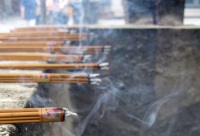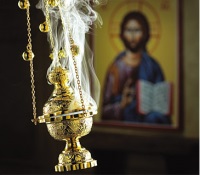Incense
Incense
Burning incense generates three things:
- smoke,
- residual ash,
- and an aroma – or stink, depending on your sensitivities.
All three can be utilised in religious rituals, but their original purpose was quite different. Its primary use was for the aroma only, to mask foul bodily stench. The smoke and ash were unwanted by-products and incense makers aimed to minimise these.
Another ancient man-made product is soap, which was not as effective as today's chemical wonders.
Although bacteria have been around since the time of Adam, we didn't know about these little critters until quite recently. Today bacteriologists help soap makers to improve the humble bar of soap; not only to have a deeper cleansing effect and be less damaging to the environment, but also to combat the awful pong that we produce if we don't wash. This endeavour is particularly appreciated by school sports instructors.
Pagan use
Ancient soap would have been pretty good at cleaning off grubby marks, but for body odour, soap did no more than replace it with pleasant perfume.
However, the effect was not long-lasting. So for places where many people would gather, such as a temple, incense was used to mask the whiff. This would be especially useful at funerals with the decay of putrid flesh. (We've passed the worst of this page now. Carry on eating your breakfast.)
Temple priests would have also noticed pesky insects buzzed off when incense was burned and their absence would aid meditation and prayer. A natural extension would be to use incense to dispel evil spirits.
Spiritual use
Can incense really dispel evil spirits?
Aromatherapists and other holistic health practitioners are often careful to point out that the most commonly available types of incense are synthetic and can fill the air with toxic substances when burned. However, burning 'natural' incense has the opposite effect and it will actually cleanse the air. Now, obviously any addition to the atmosphere will contaminate it, so what is meant by 'cleanse'?
'Cleanse', in aroma-speak, means to clear the air of negative energy and surround you with a sacred space. And that all makes perfect sense to both those who are superstitious.
Burning incense, especially in a confined space, whether natural or synthetic, makes no sense at all if you care anything about your physical health. Think second-hand tobacco smoke.
And anyone who is serious about dispelling evil spirits, or even 'negative energy', will acknowledge that a puff of smoke cannot waft away anything spiritual, even if it's sweet smelling and 'natural'. The better-educated aromatherapists will only say that incense, massage, oils, etc., can help to improve general well-being, and that in turn helps the person to relax and meditate. The therapist will not claim that incense has any direct effect on one's spirit, unless they happen to be a pseudoscientific fraudster.
Christian, Muslim and Jewish use
Abrahamic religions tend not to rely on compressed herbs, resin, etc., to repel evil spirits, although the benefits of masking body odour and repelling mosquitos are appreciated.
Christians, especially Eastern Orthodox, Catholic and Anglican, burn tons of incense every year. The ensuing smoke is a symbolic reminder to those who pray that as the smoke and sweet aroma rises, so do their prayers.
And like lots of other rituals, Christians adopted many religious practices from the Jews. And why not? Jesus was Jewish, both ethnically and religiously.
And like lots of other rituals, Jews adopted many religious practices from the Gentiles. And again, why not? We read way back in Exodus how incense should be made for Jewish worship. It also explains that the incense should be burned in the tabernacle only, and not in the home, since that would be akin to pagan worship; showing that Jews copied the idea that incense was a valuable ritual that could be converted for their religion.
Other religious uses
Hinduism, Buddhism, Daoism, Shinto and all other major religions use incense for similar purpose – the smoke being a visual symbol of prayers, or souls of the deceased, rising heaven-wards.
And not only the smoke from smouldering incense. In Asia, for example, Chinese burn paper on which written thoughts, wishes and prayers are carried to the gods (or ancestors) by the smoke. Again, this is likely to be a symbolic rather than superstitious practice, with no belief that their thoughts, wishes and prayers are actually in the smoke.
Glowing (and growing) commercial use
And finally worldwide. An increasing number (billions) of people – Eastern religion, Western religion, Pagan, and even Atheists, copy the non-sacred rituals of indigenous people to make aromatic smoke offerings to The Great God of Tobacco.
Ethnicity: Matt 1:1 and Luke 3; Heb 7:14; John 1:11-12; 4 22
Observance: Matt 5:7, 17, 19-20; Matt 14:36; Mark 15: 2; Luke 2: 39; 4: 15-16; 8: 44; 21: 37; 22: 14-15; John 2: 13; 4: 22; 5: 1; 7: 2, 10, 14; 10: 22; Num 15: 37-39; Deut 16: 16
Exod 30: 34-38

